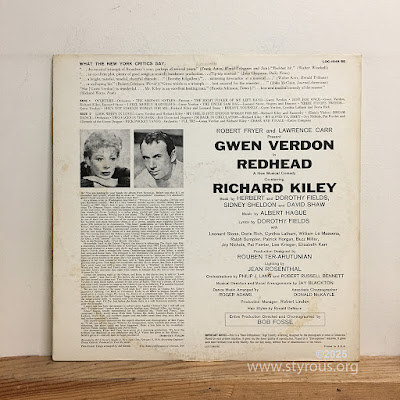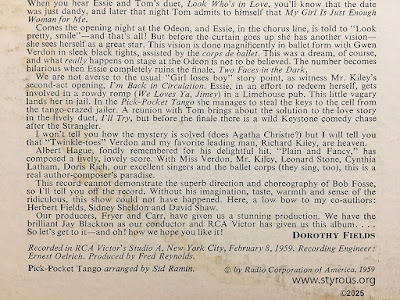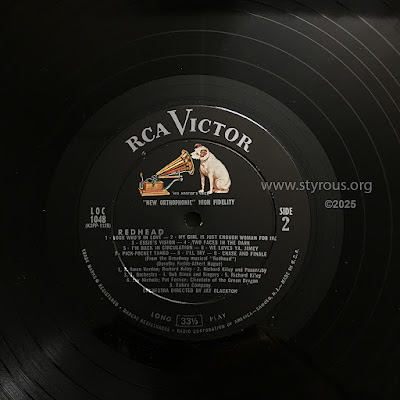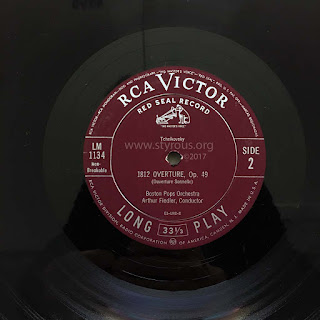~
vinyl LP front cover detail
cover design by Rouben Ter-Arutunian
detail photo of album cover by Styrous®
Today is the birthday of American choreographer, dancer, filmmaker, and stage director Bob Fosse who was known for his work on stage and screen; he is one of the most influential figures in the field of jazz dance in the twentieth century. He revolutionized musicals with his distinct style of dance and was on a par with Fred Astaire and Gene Kelly.
Fosse started his career acting in the musical productions of Call Me Mister (1947), Billion Dollar Baby (1951), and Pal Joey (1952). He transitioned into directing and choreographing musical works, winning Tony Awards for choreographing The Pajama Game (1954), Damn Yankees (1955), Redhead (1959), Little Me (1963), Sweet Charity (1966), Pippin (1972), Dancin' (1978), and Big Deal (1986), as well as for directing Pippin. He also worked on Bells Are Ringing (1956), New Girl in Town (1958), How to Succeed in Business Without Really Trying (1961), and Chicago (1975).

vinyl LP front cover detail
cover design by Rouben Ter-Arutunian
detail photo of album cover by Styrous®
Fosse forged an uncompromising modern style, characterized by finger-snapping, tilted bowler hats, fishnet stockings, splayed gloved fingers, turned-in knees and toes, shoulder rolls and jazz hands. His third wife was dancer and actress Gwen Verdon, whom he met choreographing Damn Yankees, in which she starred and with whom he collaborated on a number of theater and film projects.
Fosse's extramarital affairs put a strain on the marriage and by 1971
they were separated, although they remained legally married until his
death in 1987. Verdon never re-partnered. During their joint career, Fosse would continually take blame from
critics while Gwen Verdon would get praise. However, Verdon always looked out for him
and was Fosse's personal press secretary throughout their marriage.

vinyl LP back cover
cover design by Rouben Ter-Arutunian
photo of album back cover by Styrous®
In Redhead, Fosse used one of the first ballet sequences in a show that contained five different styles of dance: Fosse's jazz, a cancan, a gypsy dance, a march and an old-fashioned English music hall number. Set in London in the 1880s, around the time of Jack the Ripper, the musical is a murder mystery in the setting of a wax museum.
vinyl LP back cover details
cover design by Rouben Ter-Arutunian
photo of album back cover by Styrous®
vinyl LP back cover detail
cover design by Rouben Ter-Arutunian
detail photo of album back cover by Styrous®
vinyl LP back cover detail
cover design by Rouben Ter-Arutunian
photo of album back cover by Styrous®
vinyl LP back cover detail
cover design by Rouben Ter-Arutunian
photo of album back cover by Styrous®
In 1961, Fosse's epilepsy was revealed when he had a seizure onstage during rehearsals for The Conquering Hero. He died of a heart attack on September 23, 1987, at George Washington University Hospital while the revival of Sweet Charity was opening at the nearby National Theatre. He had collapsed in Verdon's arms near the Willard Hotel. As he had requested, Verdon and Nicole Fosse scattered his ashes in the Atlantic Ocean off Quogue, Long Island, where Fosse had been living with his girlfriend of four years. A month after his death, Verdon fulfilled Fosse's request for his
friends to "go out and have dinner on me" by hosting a star-studded,
celebrity-filled evening at Tavern on the Green with Verdon, Reinking, Jessica Lange, Roy Scheider, Ben Vereen, and E. L. Doctorow attending.
Tracklist:
Side 1:
Side 1:
A1 - Orchestra* – Overture
A2 - Patrons* – The Simpson Sisters' Door
A3 - Gwen Verdon – The Right Finger Of My Left Hand
A4 - Gwen Verdon, Richard Kiley, Leonard Stone – Just For Once
A5 - Gwen Verdon – Merely Marvelous
A6 - Leonard Stone – The Uncle Sam Rag
A7 - Gwen Verdon – Erbie Fitch's Twitch
A8 - Richard Kiley, Leonard Stone – She's Just Not Enough Woman For Me
A9 - Gwen Verdon, Cynthia Latham, Doris Rich – Behave Yourself
A2 - Patrons* – The Simpson Sisters' Door
A3 - Gwen Verdon – The Right Finger Of My Left Hand
A4 - Gwen Verdon, Richard Kiley, Leonard Stone – Just For Once
A5 - Gwen Verdon – Merely Marvelous
A6 - Leonard Stone – The Uncle Sam Rag
A7 - Gwen Verdon – Erbie Fitch's Twitch
A8 - Richard Kiley, Leonard Stone – She's Just Not Enough Woman For Me
A9 - Gwen Verdon, Cynthia Latham, Doris Rich – Behave Yourself
Side 2:
B1 - Gwen Verdon, Richard Kiley – Look Who's In Love
B2 - Richard Kiley – My Girl Is Just Enough Woman For Me
B3 - Orchestra* – Essie's Vision
B4 - Bob Dixon (17) – Two Faces In The Dark
B5 - Richard Kiley – I'm Back In Circulation
B6 - Joy Nichols, Pat Ferrier – We Loves Ya, Jimey, Arranged By Sid Ramin
B8 - Gwen Verdon, Richard Kiley – I'll Try
B9 - Entire Company* – Chase And Finale
Companies, etc.
Pressed By – RCA Records Pressing Plant, Indianapolis
Recorded At – RCA Victor Studios, New York
Credits:
Arranged By [Dance Music] – Roger Adams
Choreography [Associate Choreographer] – Donald McKayle
Design Concept – Rouben Ter-Arutunian
Directed By, Choreography – Bob Fosse
Lighting – Jean Rosenthal
Lyrics By, Liner Notes – Dorothy Fields
Music By – Albert Hague
Music Director, Arranged By [Vocal Arrangements] – Jay Blackton
Orchestrated By – Philip J. Lang, Robert Russell Bennett
Presenter – Lawrence Carr, Robert Fryer
Production Manager – Robert Linden
Vocals [Essie Whimple] – Gwen Verdon
Vocals [George Poppett] – Leonard Stone
Vocals [Maude Simpson] – Cynthia Latham
Vocals [May] – Joy Nichols
Vocals [Sarah Simpson] – Doris Rich
Vocals [Tilly] – Pat Ferrier
Vocals [Tom Baxter] – Richard Kiley
Written-By [Book By] – David Shaw (23), Dorothy Fields, Herbert Fields, Sidney Sheldon
Notes:
Original 1959 Broadway Cast recording of the murder mystery stage musical starring Gwen Verdon and Richard Kiley.
Recorded Feb 8, 1959
Barcode and Other Identifiers
Matrix / Runout (Side A Runout): K2 PP1128-3S A2 I
Matrix / Runout (Side B Runout): K2 PP1129-4S I A2
Matrix / Runout (Side B Runout): K2 PP1129-4S I A2
Gwen Verdon, Richard Kiley – Redhead (An Original Cast Recording)
Label: RCA Victor – LOC-1048
Format: Vinyl, LP, Album, Mono
Country: US
Released: 1959
Genre: Stage & Screen
Style: Musical
Styrous® ~ Monday, June 23, 2025
Label: RCA Victor – LOC-1048
Format: Vinyl, LP, Album, Mono
Country: US
Released: 1959
Genre: Stage & Screen
Style: Musical
Viewfinder links:
Net links:
Britannica ~ Bob Fosse
Dramatics ~ Why Bob Fosse’s influence never fizzles
Masterworks Broadway ~ Bob Fosse
PBS ~ Bob Fosse
Senses of Cinema ~ Bob Fosse
YouTube links:
Damn Yankees ~
Bob Fosse (documentary) (1 hr.)
Kiss Me Kate ~ From This Moment On



































